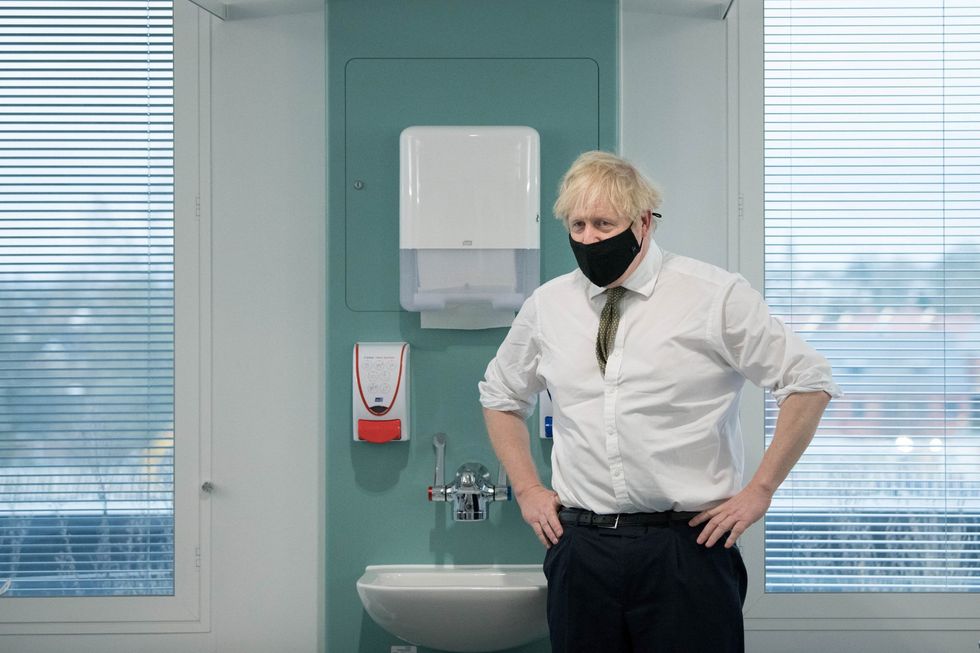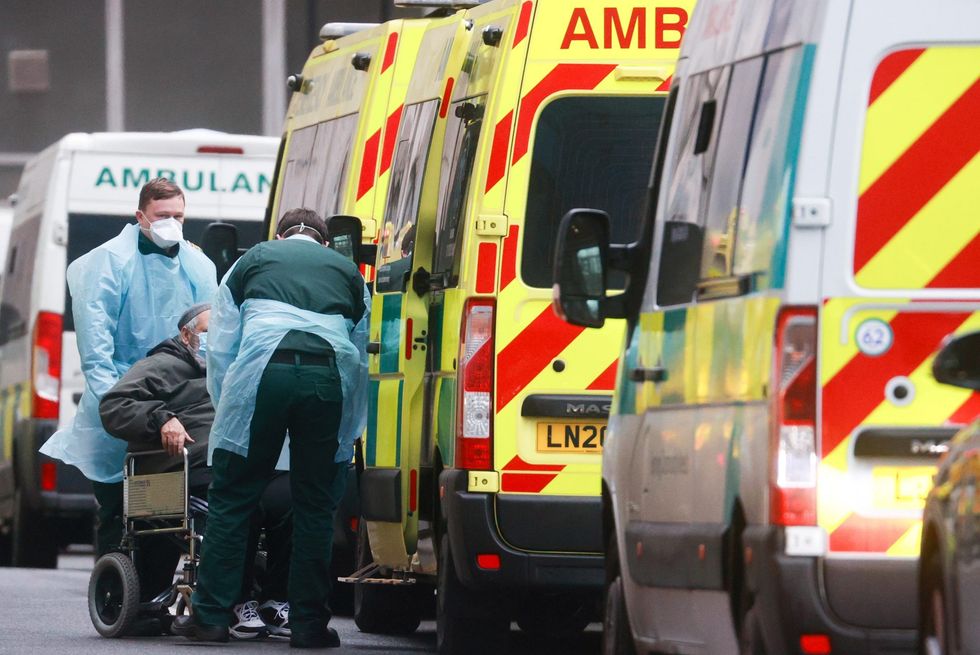by LAUREN CODLING
ASIANS have been urged to adhere to coronavirus guidelines as data showed positive cases were higher in their community than any other ethnic group in some areas of the UK.
The warning comes as England began its third Covid lockdown on Tuesday (5), with the government calling for “one last major national effort to stem the virus” before ministers hope mass vaccinations will
turn the tide against the spreading coronavirus.
Addressing the nation on Monday (4), prime minister Boris Johnson said: “The weeks ahead will be the hardest yet, but I really do believe that we are entering the last phase of the struggle, because with every jab that goes into our arms, we are tilting the odds against Covid and in favour of the British people.”
Asians are being asked to be vigilant during the national lockdown as data revealed that the number of people in the community testing positive for coronavirus was higher in some regions than among the wider UK population.

The latest available data from Leicester on Tuesday showed 42 per cent of positive tests have been recorded in the Asian community, compared to 26 per cent in the white British community. In Birmingham, data from Monday showed the positive case rate for the Asian community is 505 per 100,000 of the population. In comparison, the case rate for the white community is 235.2 per 100,000.
In Bradford, the latest figures for the week commencing December 31 showed 30 per cent of positive cases were from the Asian population. This decreased from the previous week, when 45 per cent of cases were from the Asian population.
Although there was no available data broken down by ethnicity in London, cases were high in boroughs with a large Asian population. These include Redbridge, Newham, Tower Hamlets and Hounslow.
The leader of Birmingham council, Ian Ward, admitted he was “very concerned” by the statistics. Transmission in the city was driven primarily by household mixing, he revealed. “Everybody needs to recognise that we should follow the rules around no household mixing, particularly with this new variant, because it is much more likely to be passed on than the previous variants,” he told Eastern Eye on Monday.
Ward noted that Asian families tended to have large extended families. “Not going into other people’s houses is more important than ever,” he said. He blamed a number of factors for the increase, including Asians being more likely to work in front-facing jobs and living in multi-generation households. According to him, living in a deprived area would also have an impact on the chances of contracting the virus.
In Birmingham, those from a Bangladeshi, Pakistani or a black ethnic background were more likely to live in deprived neighbourhoods. “In May, I wrote to the government saying they need a plan to address (the inequalities in society),” he said. “Unfortunately, I still haven’t heard back.”
Since the coronavirus outbreak in March, research has consistently shown the disproportionate impact Covid has had on ethnic minority communities. A report by the Institute for Fiscal Studies think tank this week revealed many ethnic minority groups have suffered much higher rates of mortality than the white majority.
Yasir Malik*, from Tower Hamlets in east London, has 12 family members who are currently suffering from Covid-19. Malik, who lives with his pregnant wife and three young children, admitted he felt “scared” for his family. His mother-in-law, who suffers from underlying health conditions, is currently in intensive care with the virus. Although her condition has improved and she does not require a ventilator any more, medics said she was lucky to be alive. “They said if we had waited another 45 minutes, it could have been dire,” Malik told Eastern Eye. “Her oxygen levels were continuously dropping.”
According to Malik, Asians in his local area did not appear to be concerned about the virus when the initial lockdown occurred in March. It was rare to see people wearing masks or adhering to social distancing guidelines, he said. “At the beginning, nobody cared because very few people were getting it, in terms of people that you knew,” said Malik, who is of Bangladeshi heritage. “During Eid, nobody cared about social distancing or not going to other people’s houses. But this time around, literally everybody’s getting it. Literally every single soul you see has got some sort of mask on.”
He also knows of people who have died from the virus, including a friend’s father.
The increase in cases has put a huge strain on the NHS. Announcing the new lockdown on Monday, Johnson said the highly contagious new coronavirus variant was spreading so fast the NHS risked being overwhelmed within 21 days. In England alone, some 27,000 people are in hospital with Covid-19, 40 per cent more than during the first peak in April. Infection numbers are expected to rise further after increased socialising during the Christmas period.
The Royal Wolverhampton Hospitals chief, Professor David Loughton, said the health service was “well and truly in the eye of the storm”. Speaking at the West Midlands Combined Authority (WMCA) media briefing last Thursday (31), he said he had witnessed the worst ambulance turnaround times he had ever seen in recent weeks. “This is because we’re not doing what we normally do,” Loughton said. “We have a winter surge plan as we expect to be busy in January and early February and part of that includes putting nurses in corridors in A&E. It’s not the right thing to do, but it’s the way we get through and nurse people in corridors to let ambulances get back on the road.”

Malik’s family have had first-hand experience with the overwhelming pressure on the NHS. His wife’s cousin was taken to the Royal London hospital last month with Covid-19, but there were no beds available, and she was forced to wait in an ambulance overnight. “She was in the ambulance for approximately 14 hours because they had no beds for her,” Malik said, adding that she was still recovering in the hospital.
In response to Eastern Eye, a government spokesperson said: “Throughout the pandemic, our focus has always been on protecting the most vulnerable people in our society and saving lives. In October, the minister for equalities provided an update on the work carried out so far to minimise the key risk factors that are having an impact on BAME communities. We are acting on these findings, and doing everything possible to ensure that our public information messaging is accessible to everyone, and is targeted in a way that reaches groups most at risk.”
Britain has been among the countries worst-hit by Covid-19. In recent weeks, two vaccines against Covid, one made by Pfizer and BioNTech and the other by Oxford University and AstraZeneca, have been rolled out across the country. More than a million people have already received their first dose.
Meanwhile, Professor Dr Bharat Pankhania, senior clinical lecturer at the University of Exeter, urged older people to ensure they looked after themselves during the Covid crisis. “Keep your mental and physical health in top condition, exercise and sleep well,” he said during a virtual meeting last month. “The great news is that the vaccine has been invented and will save lives. Exercise excellent infection control, do not get infected, do not infect others. Look positively to the year 2021.”
* Name has been changed to protect identity
(With agencies)

















 Many of these beaches are tidal and best enjoyed at low tideiStock
Many of these beaches are tidal and best enjoyed at low tideiStock It’s also unofficially clothing-optionaliStock
It’s also unofficially clothing-optionaliStock Framed by the turquoise seaiStock
Framed by the turquoise seaiStock It’s best visited early or late in the dayiStock
It’s best visited early or late in the dayiStock
